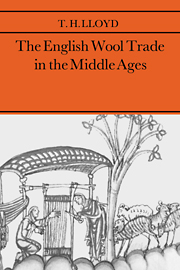Book contents
- Frontmatter
- Contents
- List of Tables and Maps
- Preface
- Abbreviations used in Notes and Bibliography
- 1 The growth of the Flemish connection
- 2 The end of the Flemish ascendancy
- 3 The Italian hegemony
- 4 The English triumphant
- 5 Edward III – woolmonger extraordinary
- 6 Quest for a staple policy
- 7 The evolution of the Calais staple
- 8 The decline of the wool trade
- 9 Marketing the wool
- Notes
- Bibliography
- Index
2 - The end of the Flemish ascendancy
Published online by Cambridge University Press: 10 December 2009
- Frontmatter
- Contents
- List of Tables and Maps
- Preface
- Abbreviations used in Notes and Bibliography
- 1 The growth of the Flemish connection
- 2 The end of the Flemish ascendancy
- 3 The Italian hegemony
- 4 The English triumphant
- 5 Edward III – woolmonger extraordinary
- 6 Quest for a staple policy
- 7 The evolution of the Calais staple
- 8 The decline of the wool trade
- 9 Marketing the wool
- Notes
- Bibliography
- Index
Summary
During the later years of the thirteenth century Flemish merchants in large measure withdrew from active participation in international trade. This withdrawal was caused partly by a concentration of energies and capital in the cloth manufacturing industry and partly by growing competition, particularly that presented by German merchants. In the case of the English wool trade, however, the chief factor was the protracted disputes between England and Flanders which occupied much of the last third of the century. During these periods the Flemings lost valuable contracts which could not be recovered when peace was restored. Flanders remained the principal market for English wool but the conduct of the trade passed largely into the hands of merchants of other nationalities. The major dispute began in 1270, but the Flemings began to experience difficulties as early as 1264 and it is likely that during the intervening years they never fully recovered the ascendancy which undoubtedly they had enjoyed at an earlier date. The occasion of the 1264 troubles was the outbreak of war between the king and the adherents of Simon de Montfort. The cause of the troubles was simply the breakdown of good government and there is small reason to accept the idea that from motives of ‘political economy’ the Montfortians adopted an attitude hostile to Flanders.
- Type
- Chapter
- Information
- The English Wool Trade in the Middle Ages , pp. 25 - 59Publisher: Cambridge University PressPrint publication year: 1977



